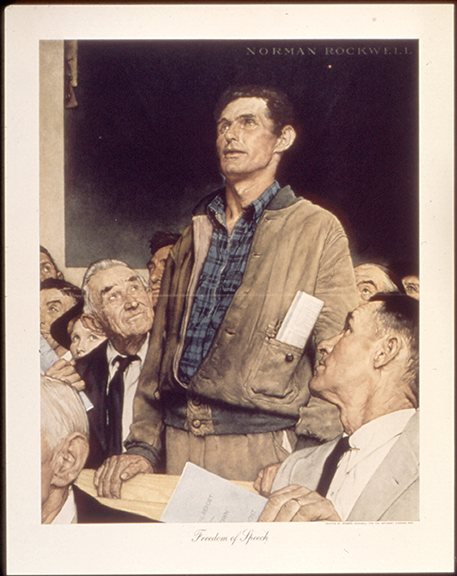J.K. Rowling, author of the Harry Potter series, defends freedom of speech — even offensive speech — May 16, 2016 at the PEN America Literary Gala, where she received the 2016 PEN/Allen Foundation Literary Service Award. (Photo/Video: PEN America).
The idea that even offensive speech must be protected is an important theme in the history and philosophy of communications law worldwide. John Stuart Mill said in On Liberty:
… the peculiar evil of silencing the expression of an opinion isthat it is robbing the human race; posterity as well as the existing generation; those who dissent from the opinion, still more than those who hold it. If the opinion is right, they are deprived of the opportunity of exchanging error for truth: if wrong, they lose, what is almost as great a benefit, the clearer perception and livelier impression of truth, produced by its collision with error.
We also find this very frequently in opinions of the Supreme Court on First Amendment cases. In one of the bedrock cases, New York Times v Sullivan (1964), for example, the court noted:
“… we consider this case against the background of a profound national commitment to the principle that debate on public issues should be uninhibited, robust, and wide-open, and that it may well include vehement, caustic, and sometimes unpleasantly sharp attacks on government and public officials… Erroneous statement is inevitable in free debate, and … it must be protected if the freedoms of expression are to have the “breathing space” that they “need . . . to survive.”
In an earlier case, Whitney v California (1927), the court also said:
Those who won our independence believed . . . that public discussion is a political duty, and that this should be a fundamental principle of the American government. They recognized the risks to which all human institutions are subject. But they knew that order cannot be secured merely through fear of punishment for its infraction; that it is hazardous to discourage thought, hope and imagination; that fear breeds repression; that repression breeds hate; that hate menaces stable government; that the path of safety lies in the opportunity to discuss freely supposed grievances and proposed remedies, and that the fitting remedy for evil counsels is good ones. Believing in the power of reason as applied through public discussion, they eschewed silence coerced by law–the argument of force in its worst form. Recognizing the occasional tyrannies of governing majorities, they amended the Constitution so that free speech and assembly should be guaranteed.

